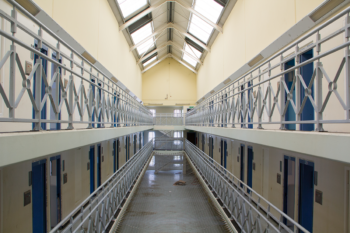 Non-religious people are being discriminated against in prisons in the provision of chaplaincy and pastoral care services, new research has found. The research, published in the International Journal of Law in Context, found a hierarchy of access in which the benefits of such services are more available to some prisoners than others. Dr Katie Hunt, the author of the research, argues this discrimination is particularly depriving non-religious offenders of the ability to connect with like-minded people. This puts them at a disadvantage when compared to their peers – contrary to the Equality Act 2010.
Non-religious people are being discriminated against in prisons in the provision of chaplaincy and pastoral care services, new research has found. The research, published in the International Journal of Law in Context, found a hierarchy of access in which the benefits of such services are more available to some prisoners than others. Dr Katie Hunt, the author of the research, argues this discrimination is particularly depriving non-religious offenders of the ability to connect with like-minded people. This puts them at a disadvantage when compared to their peers – contrary to the Equality Act 2010.
The Non-Religious Pastoral Support Network (NRPSN) trains and accredits non-religious pastoral supporters to provide care in prisons and elsewhere. Today it welcomed the research. It is hoped it will strengthen the case for Her Majesty’s Prison and Probation Service (HMPPS) to open up and actively recruit more non-religious carers into their pastoral support and chaplaincy teams.
Prisoners have long been recognised as a disenfranchised group. However, this research demonstrates that as a result of outdated legislation, inconsistent prison policies, and prisoner perceptions of the religiosity of chaplaincy provision, these services are less accessible to the non-religious. They have far fewer opportunities to receive support than religious people. Overall, it concludes that the non-religious are treated less favourably than religious prisoners and are particularly disadvantaged by universal prison policy. Dr Hunt recommends that changes are needed to both HMPPS guidance and legislation to tackle these areas of discrimination.
Dr Katie Hunt commented:
‘Religious and non-religious prisoners are treated differently by HMPPS. This is not just a legacy of a previously exclusively religious chaplaincy service. It is also built into the Prison Service Instructions, which govern the day to day operation of prisons, and are justified by outdated provisions in the law. Prisoners of “no faith” are marginalised in a range of ways, from everyday microaggressions to statutory inequalities. Meaningful reform can only be achieved with substantial changes to both prison policy across HMPPS and the legislation.’
Clare Elcombe Webber, Head of Humanist Care at Humanists UK commented:
‘Non-religious prisoners make up the second largest belief group within English prisons. But they receive little to no like-minded pastoral support, such as is available to their religious counterparts. Over the last decade, HMPPS has made great strides in moving towards a model for pastoral services that is underpinned by the understanding that there are times when a prisoner needs to speak to someone who shares their worldview. It is understood and not controversial, for example, that Muslim prisoners can get support from an Imam, or a Jewish prisoner from a Rabbi. Yet this same principle and respect for different belief systems is only extended to non-religious prisoners in a handful of institutions, and then only by volunteers.
‘We are pleased that this research has thrown a light onto these failings. We have been calling for years for the Prison Service Instructions to be redrafted to adequately address the pastoral needs of non-religious prisoners. The Prison Act 1952 also needs to be amended to allow prisons to employ pastoral carers in line with the belief demographics of their populations. We hope as a result of these findings HMPPS will open up more paid pastoral support roles to non-religious candidates.’
Notes:
For further comment or information, media should contact Humanists UK Director of Public Affairs and Policy Richy Thompson at press@humanists.uk or phone 020 7324 3072 or 020 3675 0959.
Read more about the Non-Religious Pastoral Support Network.
Read more about our work on pastoral support.
The NRPSN was founded in 2016 to provide high-quality pastoral, spiritual, and specific non-religious care in the NHS, HMPPS, and the armed forces to non-religious people experiencing challenging life circumstances. To this end it has trained and accredited a network of over 300 pastoral carers who are operating both in a voluntary capacity across these three services, and in paid positions within NHS Chaplaincy and Pastoral Support teams. Although founded as part of Humanists UK, membership of the NRPSN is not limited to humanists and is open to all those who hold a non-religious worldview that is consistent and worthy of respect in a democratic society. Before the pandemic, we had 22 pastoral carers operating or awaiting CTC clearance in 20% of prisons across England and Wales. Similarly, there are now nine non-religious pastoral carers employed in ten posts by NHS trusts, with an employee, staff member, or volunteer in over 40% of trusts. That number is growing at a rate of about 10 percentage points a year.
Humanists UK is the national charity working on behalf of non-religious people. Powered by 100,000 members and supporters, we advance free thinking and promote humanism to create a tolerant society where rational thinking and kindness prevail. We provide ceremonies, pastoral care, education, and support services benefitting over a million people every year and our campaigns advance humanist thinking on ethical issues, human rights, and equal treatment for all.
